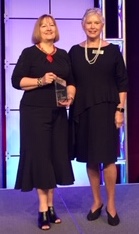
But that didn’t stop Schirling, who spent her career crafting rock-solid foundations upon which others could build. The CEO’s secretary passed on a copy of “Overview,” the precursor to NAMSS’ “Synergy.” Schirling wrote an article for the publication, which was published in 1985. That same year, she was accorded her CPMSM® certification, attended her first NAMSS conference in Boston, and received the Overview Award for her writing. “It was a banner year,” Schirling recalls.
From that point on, Schirling tirelessly worked to put in place the building blocks that enabled MSPs to obtain the tools and recognition they deserved. “Sue King, who was incoming president in 1985, invited me to serve on NAMSS’ Certification Council,” Schirling says. “That was the start of my NAMSS career.”
Amplifying NAMSS’ Voice
Jodi Schirling became increasingly involved with the Certification Council, moving from member to co-chair, and then to chair. During that time, she traveled from her home in Delaware to New York City to visit Professional Testing Corporation, the company that developed and administered the CPMSM® exam. She was also the exam’s de facto ambassador. “We marketed the exam to two groups,” Schirling says. “We encouraged medical staff coordinators to develop professionally and become certified, and also reached out to physician and hospital leadership.”
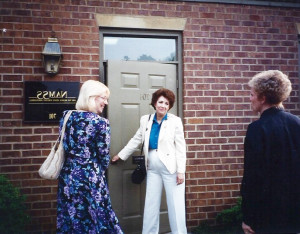
Geneva Harris, Margaret Nicholson, and Holly Jones at the door of the first internal NAMSS office
While serving on the NAMSS board and throughout her 1992-1993 term as president, Schirling continued contributing to the profession’s infrastructure. “NAMSS had always been run by volunteers, but it was becoming too big to handle,” she says. “We were too small for some association management firms, so Mimi Cruz, Patty Strasberg, and I met one weekend at my hospital and put together an RFP for an executive office and executive director.” That work laid the groundwork for the organization establishing its first internal office in Knoxville, Tenn.
Jodi Schirling was also instrumental in boosting the organization’s national profile. While on the NAMSS board, Schirling was part of an effort to lobby then-U.S. Representative Jimmy Duncan (R-TN) for a proclamation declaring the first week in November as National Medical Staff Services Awareness Week. That effort bore fruit during Schirling’s term as president, when she and Past President Holly Jones traveled to Washington, D.C. in December 1992 to receive Congressional House Joint Resolution #399, which was signed by President George W. Bush.
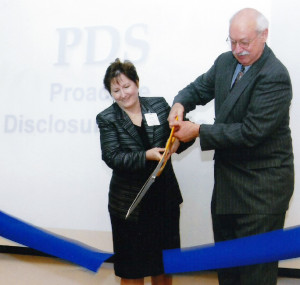
At the April 30, 2007 ribbon cutting for the NPDB Proactive Disclosure Service
Because of her proximity to the nation’s capital – an inexpensive train ride away from Delaware – NAMSS tapped Schirling to represent the organization on the National Practitioner Data Bank (NPDB) Committee. Over the course of 12 years, Schirling met with the Health Resources and Services Administration and explained how MSPs sought to use the NPDB, an electronic repository of medical malpractice payments and adverse action reports.
In 2018, Schirling was accorded the ultimate recognition, when she was inducted into the NAMSS Healthcare Hall of Fame.
Finding Her Professional Home
Echoing the experience of other pioneers in the MSP profession, Jodi Schirling’s early part-time medical staff secretary position soon evolved. “As The Joint Commission standards and requirements changed, my job morphed into a full-time role,” she says. Over the next decade, Schirling became responsible for medical staff services, compliance and oversight of the medical library, weekly grand rounds, and The Joint Commission. In other words, “all the stuff that went with dealing with the medical staff,” she says.
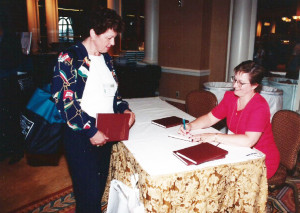
Jodi signing her book, “Acute Care Credentialing,” at the 2001 NAMSS conference at Caesar’s Palace in Las Vegas
Eventually, though, Schirling felt stifled. “When you start out young and grow into the position, some physicians and administrative folks can’t see you beyond your current role,” she says. “That was true for me.”
She applied for and was offered a manager’s position at duPont Hospital for Children in Wilmington, Del., part of Nemours Children’s Health System. “It was the best career move I could have made,” Schirling says. There, she again did the hard work of creating a solid foundation in a position that had been vacant for four months. “They didn’t have board-approved bylaws, so I had to write bylaws,” she recalls. “There were pending applications and reappointments, so I tucked in and got it done.”

Jodi and her husband, Terry, enjoy traveling
When Nemours furthered its expansion, the organization moved to centralize the credentialing function throughout the health system. Schirling applied for and was offered the directorship of corporate credentialing. She relished the rewarding work, particularly her role in operationalizing a brand new children’s hospital in Orlando, Fla. “I created a proposal to launch a corporate department designed to maintain standards throughout the system with regard to physician onboarding and recruitment,” she says. “It was really cool to see the doors open, realize that physicians were seeing patients, and know that you were there before the first spade of dirt was turned.”
Stepping Back and Moving Forward
Jodi Schirling took an early retirement in 2015, when her mother-in-law moved in with Schirling and her husband. She cared for her mother-in-law, who had broken her hip and suffered from dementia, until she passed in 2018. Schirling appreciates the advice given to her from Sue King, namely, to always be grooming your replacement. “She taught me to always identify my potential replacement and not to be afraid to put them in that role,” Schirling says. In fact, the person who took over for Schirling came from within the organization. “They were mentored and coached and given opportunities, just as I was by my boss.”
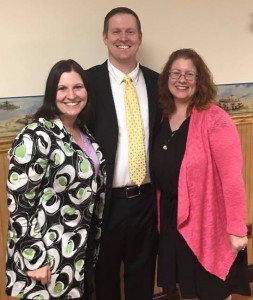
Jodi’s children Hope, Joy, and Kenneth
Schirling learned two other important lessons over the course of her career: flexibility and fallibility. “It sounds like an oxymoron, but you have to be flexible and you have to adapt,” she says. “You have to hold on to your standards, but be flexible in how to achieve them.” The piece of advice she’d give to her younger self is to let go of perfectionism. “It’s okay to make mistakes,” she says. “People forgive if your mistake was an honest one.
The foundations that Schirling created within the medical staff services community remain rock-solid. “I had a great career and wonderful support systems,” she says. “I really enjoyed what I did and met wonderful people along the way.”

